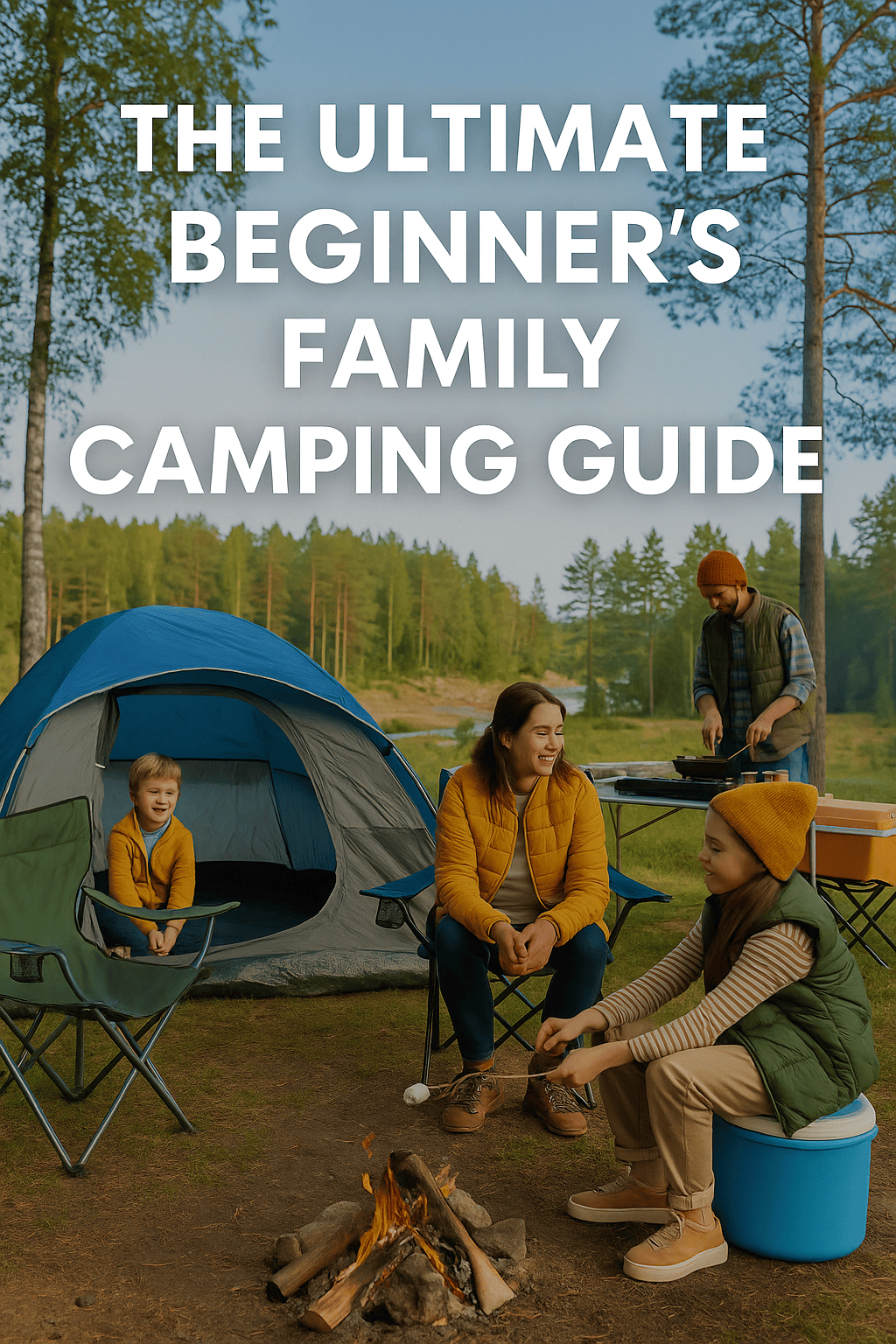Camping holds a unique charm. Imagine waking up to gentle birdsong instead of alarms, seeing wildlife instead of cruddy old apartment buildings, smelling fresh air instead of the trash outside, or gathering your family around a crackling fire under a clear, star-lit sky. It’s a return to simplicity, a perfect antidote to our modern, screen-filled lives. If you’re considering camping for the first time, especially with kids, you’re about to embark on an adventure that could transform your family forever. We as a family love camping and it is just a ton of fun. Even if you are just camping near the city, being outdoors and making burgers, hotdogs, and walking around in nature somehow just makes the day a lot less stressful.
Here’s your comprehensive, step-by-step guide to ensure your first family camping trip is smooth, safe, and unforgettable.
Why Camping is Perfect for Families
Family camping isn’t just about sleeping outdoors. It’s about connection. Unlike a typical hotel vacation, camping invites genuine conversations, teamwork, and creativity. From setting up the tent together to cooking meals as a family, everyone has a role, building bonds and confidence along the way.
Camping is budget-friendly, flexible, and educational. It’s an accessible way to introduce children to nature, science, and sustainability firsthand, turning the world around them into a living classroom. Once you have all of the necessary camping gear, and believe me you don’t need much, camping is super cheap. All you really need is a tent, a small grill, a couple of blankets, and as I have gotten older, a sleeping mat or air mattress, you are set. These are one time costs and can be used over and over and over until you need to replace them. If you don’t want to buy new equipment go on Craigslist or OfferUp or any other used site to get good equipment for cheap.
Choosing the Right Type of Camping for Beginners
For your first trip, consider car camping, where you park close to your campsite. This offers convenience, allowing you to bring more gear without the stress of long hikes or complex logistics. Many established campgrounds offer amenities such as restrooms, potable water, picnic tables, and fire pits—perfect for easing your family into camping comfortably. If you are not use to using the bathroom outside, you may run into an issue with not being able to use the bathroom until you get back home. If that becomes a problem try not to eat too much. Otherwise, get yourself a portable toilet, cool to use and great for privacy and germs. We use this one. Might not be the most expensive one but it does the job.
As you gain experience, you can explore backpacking, RV camping, or wilderness camping. But initially, simplicity is your friend. This is advanced camping and takes a lot of preparation. Even if you don’t advance to these stages regular camping is still a lot of fun. We have explored all of these with our kids, and the most fun we have is regular camping because it is easy to and can be done anyway and doesn’t take a lot. If you don’t want to invest in a lot of gear and don’t have the space for it, stick with it because everyone can join in and it is a lot of fun!
Finding Beginner-Friendly Campsites
Choose a campsite within easy driving distance (ideally less than two hours from home). Look for sites that offer:
- Flat ground or tent pads: Easier setup and comfort.
- Proximity to bathrooms and water sources: Important for families with young children.
- Well-maintained, clearly marked sites: Reduces stress and enhances safety.
Use online resources like Recreation.gov, ReserveAmerica, or The Dyrt app to find suitable locations and read detailed reviews. Remember to book well ahead, popular campsites fill quickly, particularly during weekends or summer months.
Essential Camping Gear for Families
Your gear greatly influences your comfort level, especially when camping with kids. Here are essentials that ensure your first experience is pleasant:
Shelter and Sleep:
- A spacious tent rated for more people than your group size to comfortably accommodate your gear.
- Quality sleeping pads or inflatable mattresses for insulation and cushioning.
- Sleeping bags suitable for the expected temperatures.
- Pillows and extra blankets for comfort.
Lighting:
- LED lanterns for illuminating common areas.
- Individual headlamps or flashlights for nighttime walks and personal use.
Camp Kitchen:
- A reliable propane stove for easy meal preparation.
- Basic cookware (pots, pans, spatulas).
- Cooler with good ice retention for food safety.
- Reusable dishes, utensils, cups, and cleaning supplies.
Furniture and Comfort:
- Folding camp chairs and a compact table.
- A tarp or canopy for sun and rain protection.
- Comfortable shoes and weather-appropriate clothing.
Meal Planning Made Easy
Simple, nutritious meals are essential. Plan ahead by preparing ingredients at home:
- Breakfast ideas: Pre-made pancake batter, oatmeal packs, granola bars, fresh fruit.
- Lunch options: Sandwiches, wraps, cheese, crackers, pre-made salads.
- Dinner recipes: Foil packet dinners (veggies, protein, seasoning), pasta dishes, chili or soup prepared in advance and reheated at camp.
Always pack plenty of snacks—nuts, trail mix, dried fruit, jerky, and crackers—especially important with kids around.
Dressing for Comfort and Weather
Weather can change quickly. Prepare with layers:
- Base layers: Moisture-wicking clothing to manage sweat and comfort.
- Insulating layers: Fleece or wool sweaters to keep warm.
- Outer layers: Waterproof jackets and pants for rain protection.
- Accessories: Hats, gloves, wool socks, sturdy footwear, and sunglasses.
Always bring extra clothes for kids, who tend to get wet or muddy quickly. Pack a dry set of clothing in waterproof bags for emergencies.
Ensuring Safety at Your Campsite
Family safety is paramount. Ensure you bring and use:
- A comprehensive first-aid kit: Include bandages, antiseptics, allergy medicine, and pain relievers.
- Emergency communication: Fully charged phones, power banks, and possibly a satellite messenger for remote areas.
- Navigation: A printed map of the campsite area and a compass or GPS device.
- Protection from wildlife: Store food securely in sealed containers or bear-resistant lockers provided by the campground. Educate your family on respecting wildlife, observing from a distance, and not feeding animals.
Comfort and Staying Dry
Weather is unpredictable—be prepared:
- Lay a tarp under and above your tent to protect against ground moisture and rain.
- Set up your tent at home first to check for leaks or damage.
- Pack extra towels and quick-drying clothing.
- Consider an air mattress or quality camping pads to ensure a restful sleep.
Family-Friendly Activities and Entertainment
Camping is the ideal backdrop for fun and education. Bring along:
- Binoculars for birdwatching or wildlife viewing.
- Nature journals and art supplies for drawing or writing about discoveries.
- A simple guidebook for identifying local plants, birds, and animals.
- Portable games or sports equipment like frisbees or soccer balls.
- Storybooks and cards for quiet, cozy evenings by the campfire.
Encourage kids to lead a scavenger hunt or nature exploration. Activities like these build lasting memories and a deeper appreciation for nature.
Tips from Experienced Campers
Veteran campers often advise beginners to:
- Always test gear at home first.
- Start small—overnight or weekend trips—to get comfortable.
- Pack a small comfort item (favorite pillow, stuffed animal, or cozy blanket).
- Bring extra snacks and water—better to have too much than too little.
- Stay flexible and have a positive attitude; unexpected events can become treasured memories.
First Night Under the Stars: What to Expect
Your first night camping might feel unusual. Sounds are different, darkness is deeper, and temperatures cooler. Embrace these changes. Create comfort with a warm drink, comfortable sleeping arrangements, and a flashlight or lantern for easy nighttime navigation.
If your kids are restless, tell stories, look at the stars, or simply share conversations. The first night sets the tone for your family camping adventures to come.
Pre-Trip Checklist
Before departure, ensure you have:
- Confirmed campsite reservation details.
- Tested all your gear and packed backup batteries.
- Prepared meals and snacks clearly labeled for easy access.
- Packed clothing appropriate for all weather possibilities.
- Established clear roles for each family member.
Camping as a Family Tradition
After your first successful trip, camping can quickly become a beloved family tradition. Each journey will build skills, increase confidence, and deepen your family bonds. Soon, the outdoors won’t feel unfamiliar at all; instead, it becomes a familiar refuge from everyday stress.
Camping isn’t just about exploring nature—it’s about rediscovering each other. Every moment you spend outdoors together is a moment of growth, love, and shared happiness.
FAQs for First-Time Family Campers
How early should I book a campsite?
For popular sites, aim for 3–6 months in advance. Less busy campgrounds can be booked a few weeks ahead.
What’s the best sleeping arrangement for families?
Choose a tent one size larger than your family’s size, and invest in quality sleeping pads or inflatable mattresses for comfort.
How do we deal with bad weather?
Bring rain gear, extra tarps, and indoor activities. Embrace the rain as part of the adventure.
Is it safe to camp with young children?
Absolutely—just take extra precautions, pack safety essentials, and choose campsites close to amenities.
Should we bring electronic devices?
Minimal electronics are fine, such as phones for safety or navigation. But limit their use to fully enjoy the camping experience.
Family camping is an unforgettable adventure that fosters connection, education, and appreciation for the natural world. With this guide, you’re more than prepared—you’re ready to create lasting family memories under the stars.

